Happy #EarthDay. We’re lucky to have such an amazing place to live.
Spend some time outside today, wherever you are. And let’s all take care of our beautiful planet and its co-inhabitants every day of the year.
🌍 🦋 🌳 🐢🦜 🌱 🍄 🦠 🐅 ⛅️

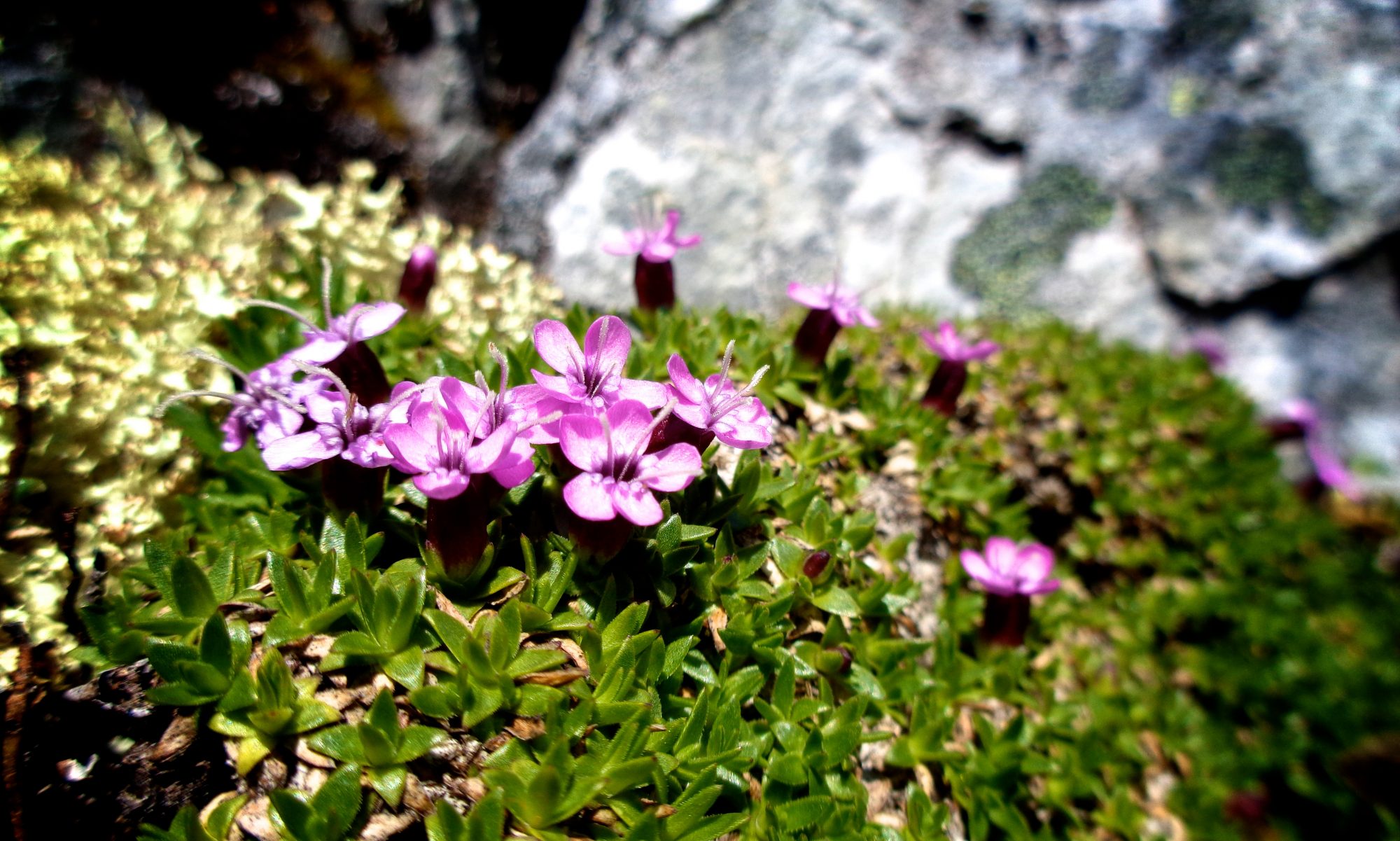
Insect Ecology Lab @UNBC
Happy #EarthDay. We’re lucky to have such an amazing place to live.
Spend some time outside today, wherever you are. And let’s all take care of our beautiful planet and its co-inhabitants every day of the year.
🌍 🦋 🌳 🐢🦜 🌱 🍄 🦠 🐅 ⛅️

THIS POSITION IS NOW FILLED. WE WILL BE LOOKING FOR AN UNDERGRADUATE RESEARCH ASSISTANT FOR THE SUMMER OF 2022.
We are seeking an excellent M.Sc. student to study forage crop insect pest and predator management biodiversity along the Highway 16 corridor in central British Columbia. This project will be sponsored by the British Columbia Forage Council and the Climate and Agriculture Initiative BC and is pending a successful MITACS application. Assuming a successful MITACS application, thesis work must begin on 1 May 2022. There may also be an opportunity for an earlier non-degree research contract (January to April 2022) prior to beginning studies.
MITACS funding will provide a $20000/year stipend for the M.Sc. student, some research costs (others to be covered by existing operating funds), and research travel costs. The MITACS funding will also provide one undergraduate field and lab research assistant for the 2022 and the 2023 summers. In addition, the M.Sc. student will have the advantage of making connections in BC’s agricultural sector via interactions with our funding partners and their networks. The BC Forage Council will also assist the student in finding appropriate field sites for the study.
The student will be co-supervised by Dr. Dezene Huber (University of Northern British Columbia) and Dr. Jasmine Janes (Vancouver Island University) and will be enrolled in the graduate program in the Natural Resources and Environmental Studies Institute at the University of Northern British Columbia in Prince George, British Columbia.
Outstanding applicants with a strong and demonstrable interest in insect ecology should send their CVs and a cover letter to huber@unbc.ca by 31 October 2021. Please feel free to contact Dr. Huber prior to submitting your CV and cover letter to discuss your interests as they relate to the project.
Graduate applications for May 2022 admission to UNBC are due by 15 December 2021. Acceptance into the program will be contingent upon the MITACS application being successful. Please do not apply to the UNBC NRESI graduate program until you have spoken with us as only one applicant will be chosen for this graduate opening.
This year I wanted my final exam for Molecular Cell Physiology (UNBC BIOL 312) to be as open as possible, so I’m posting it here online.
Students who take BIOL 312 at UNBC have already taken basic cell biology. BIOL 312 integrates the details of basic cell biology into larger concepts. We spent a lot of time this (online) semester studying developmental biology, including a book club discussion on Neil Shubin’s Your Inner Fish.
The final exam for this course is intended to allow the students to showcase everything that they have learned over the course of the past two semesters, and to use their detailed knowledge to assess big ideas in evolutionary developmental biology.
This is the final exam, below. I’d love to hear your ideas for improvement in future years.
Also feel free to use/modify/etc. this exam or concept for your own courses.
BIOL 312 Final Exam (2021 Winter semester)
Each of these papers below, listed in chronological order of publication, is either a classic scholarly work in the field of evolutionary developmental biology or is a relatively new paper of potential long-term importance to the field.
The PDFs of these works are available in the final exam folder on Blackboard. They are also available via the UNBC library.
Lewis, E. B. (1978) A gene complex controlling segmentation in Drosophila. Nature 276:565-570. https://doi.org/10.1038/276565a0 Scholarly works that cite this paper.
Nüsslein-Volhard, C. & Wieschaus, E. (1980) Mutations affecting segment number and polarity in Drosophila. Nature 287:795-801. https://doi.org/10.1038/287795a0 Scholarly works that cite this paper.
Daeschler, E. B., Shubin, N. H. & Jenkins, F. A. (2006) A Devonian tetrapod-like fish and the evolution of the tetrapod body plan. https://doi.org/10.1038/nature04639 Nature 440:757-763. Scholarly works that cite this paper.
Tan, T., Wu, J., Si, C., Dai, S., Zhang, Y., Sun, N., … & Belmonte, J. C. I. (2021) Chimeric contribution of human extended pluripotent stem cells to monkey embryos ex vivo. Cell 184:2020-2032. https://doi.org/10.1016/j.cell.2021.03.020 Scholarly works that cite this paper.
Please pick one paper from the papers listed above as your exam topic.
Along with each citation above, I have included a Google Scholar link to scholarly works that cite the paper in question. In the case of the older works, those will give you some idea of the novel research that the paper you’re interested in has stimulated over the years.
This exam is, obviously, open book. You may use course materials or any other resources you wish. You may also discuss your work with others. However individual writing must be unique. I.e., don’t simply cut and paste from others’ work – write in your own words.
Please write a four-page (maximum), double-spaced, short paper describing the contents of the article that you have chosen. Please see below for the required outline. I will not mark beyond four pages. You must adhere to these formatting stipulations or you will lose marks.
You should also include a short citation section at the end – the citation section does not count toward your page limit. The citation format is up to you, just be consistent.
Use concepts and terms we have discussed over the course of the semester.
Discuss one other scholarly work the article you have chosen has influenced or the work it will likely influence (for the newer article). The links to citations may be useful here, but you may also find other papers that relate to the concepts in your chosen article and to the concepts you will discuss in your exam paper. Be sure to properly cite this scholarly work.
Work to integrate many of the cell physiological (etc.) concepts that we have covered in BIOL 312 and in your introductory cell biology course (e.g. UNBC BIOL 311). In particular, discuss concepts related to evolutionary developmental biology. Think all the way from the scale of the genome to the cell to tissues, organs, and organisms… and then think about the evolution of genomes and organisms across deep time. Be creative and think broadly. Do not simply restate facts. Think and write around, above, below, and beyond the topic.
This exam must be handed in via the link provided in Blackboard. I will not accept or mark emailed submissions.
The exam is due at our scheduled exam date and end time: 1200h (noon) on Thursday 29-APR-2021 Pacific Daylight Time.
You are allowed one hand-in attempt at at time. If you hand something in to Blackboard in error, let me know and I will erase your attempt so that you can make another. Papers should be handed in as Blackboard-compatible file formats – so generally use DOCX or PDF files (although other files types may work).
This is the outline that you must follow:
I will be using this outline as the marking rubric, so please adhere to it.
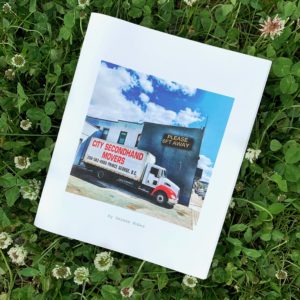 April is designated as National Poetry Month. I assume that designation is for the United States, but I figure that it might as well be for everywhere else as well. Poetry does not reside in one country. Arguably poetry does not reside in one month either, so…
April is designated as National Poetry Month. I assume that designation is for the United States, but I figure that it might as well be for everywhere else as well. Poetry does not reside in one country. Arguably poetry does not reside in one month either, so…
Part of National Poetry Month is National Poetry Writing Month, or #NaPoWriMo. Poets are encouraged to write a poem each day of April. I have taken part in this during a number of recent Aprils, and you can see the (variable) results here. I write poems at other times too, but life gets in the way and, if nothing else, April forces me to pay attention to the world around me a bit more than normal.
This year, as everyone in the world knows, North America pretty much shut down in the middle of March due to COVID-19. One Friday in mid-March I was delivering an invertebrate zoology lab on insects (absolutely my wheelhouse) to about 50 undergraduates, and by the following Monday I was trying to figure out how to deliver the rest of the semester remotely. It was jarring for me as an instructor, and likely doubly so for my long-suffering students who then graciously put up with my attempts at online lecturing.
(Aside: Thank you all of my undergraduate and graduate students. I can’t ever fully express how much I appreciate you. I feel like crying as I type this.)
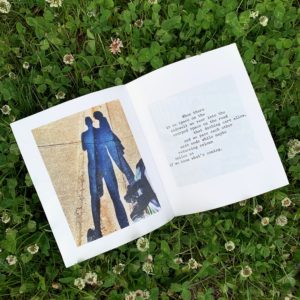 During some less fraught #NaPoWriMo Aprils, I have written whatever strikes my fancy on any given day. However this April was wall-to-wall COVID-19. April Fool’s Day was anything but fun foolery this year. Most– all! – of us were more concerned with not getting infected, and not getting our friends and family infected. We were indoors all day other than an afternoon walk. Those of us lucky enough to still have paying jobs were trying to navigate a new normal (I hate that overused term). Everyone was navigating a new normal (I still hate that overused term, but I’ll use it anyway). Going out for groceries took a level of planning that one might normally associate with prepping for a military patrol in a hostile sector. We spent our mornings and afternoons listening to politicians and their associates – some more reputable (and ultimately more successful and curbing the effects of this pandemic) than others. No one knew what was next. To be honest, we still don’t.
During some less fraught #NaPoWriMo Aprils, I have written whatever strikes my fancy on any given day. However this April was wall-to-wall COVID-19. April Fool’s Day was anything but fun foolery this year. Most– all! – of us were more concerned with not getting infected, and not getting our friends and family infected. We were indoors all day other than an afternoon walk. Those of us lucky enough to still have paying jobs were trying to navigate a new normal (I hate that overused term). Everyone was navigating a new normal (I still hate that overused term, but I’ll use it anyway). Going out for groceries took a level of planning that one might normally associate with prepping for a military patrol in a hostile sector. We spent our mornings and afternoons listening to politicians and their associates – some more reputable (and ultimately more successful and curbing the effects of this pandemic) than others. No one knew what was next. To be honest, we still don’t.
So April 2020 presented a perfect foil for my #NaPoWriMo musings. During that month I put together a poem for each day, plus some photographs, that documented what was coming at me and my family. I don’t expect that my experiences were solitary. I’ve experienced quite a bit of craziness up to now in my middle-aged life, but nothing compares with this. Nothing has ever been as comprehensively global. Nothing has left me feeling that I could have similar discussions with someone in my local grocery store (socially distanced, of course) or a market in, say, Tanzania. Nothing has left me completely not knowing what’s next.
COVID-19 has added a level of stochasticity to our lives that juxtaposes with grinding monotony. That means that we often can’t tell one day from another even though each day feels completely whacked. In an attempt to emulate that uncertainty in verse, I used an app called Word Swag that takes short passages and randomizes the line structure. Most people use Word Swag to produce funky invitations and posters and the like. I used it to input my short COVID-19 poems and let it delineate line breaks for me. That resulted in internal rhyming, unexpected rhythms, and a sense of unpredictability imposed upon my short verses.
I have taken those #NaPoWriMo poems, along with a few of the photographs that I took during that early period of the pandemic, and have turned them into a chapbook.
I will mail you the chapbook for free, but in return I simply ask that you either:
1) donate any amount to a conservation-based charity of your choice, or
2) spend some time in natural area near to where you live – and that could, of course, range from some distant backcountry to an urban greenbelt a few hundred meters from your front door to your own pesticide-free lawn and garden. I’m not picky!
If you donate, please simply send me a PDF copy or screenshot of your donation receipt. If you spend time appreciating your local environment, just send me a photograph of your time spent.
You can DM me your photo or receipt or whatever at @docdez on Twitter or at huber@unbc.ca. Please send your name and snail 🐌 mail address as well so that I can send a copy.
I will print a first edition of 25 chapbooks. If there’s more interest than that, I’ll print up editions in batches 25 or so after that. I will mail this to you wherever in the world you happen to be.
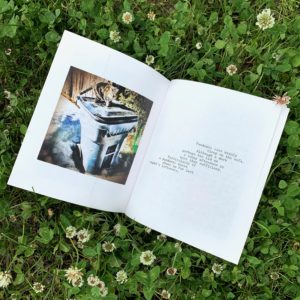 This pandemic, like virtually every human pandemic prior to this, was brought on due to conservation and food supply malpractice. Right now our valiant health care professionals are treating the acute symptoms that are devastating individuals and families. But we, as a global society, need to confront the direct causes so that this doesn’t happen again. Specifically, we need to stand against the pervasive materialist consumerism that has us encroaching upon nature, consuming beyond the planet’s capacity, and exploiting and degrading ecosystem services. Combine that with climate change, and the existential crisis that we now confront is beyond that ever faced by humanity. Our current generations – young, and old, and in-between – need to deal with this, or there will be no future generations to appreciate the beauty of our pale blue dot. Don’t let anyone fool you, this work will not be easy or short term. The current pandemic pales in comparison to dealing with the root causes.
This pandemic, like virtually every human pandemic prior to this, was brought on due to conservation and food supply malpractice. Right now our valiant health care professionals are treating the acute symptoms that are devastating individuals and families. But we, as a global society, need to confront the direct causes so that this doesn’t happen again. Specifically, we need to stand against the pervasive materialist consumerism that has us encroaching upon nature, consuming beyond the planet’s capacity, and exploiting and degrading ecosystem services. Combine that with climate change, and the existential crisis that we now confront is beyond that ever faced by humanity. Our current generations – young, and old, and in-between – need to deal with this, or there will be no future generations to appreciate the beauty of our pale blue dot. Don’t let anyone fool you, this work will not be easy or short term. The current pandemic pales in comparison to dealing with the root causes.
At this moment, people are dying because of your and my and our ancestors’ selfish choices. This needs to end. It needs to end today. It should have ended yesterday, but today is better than tomorrow.
Your donations to conservation-based charities, and your time spent in nature make a true difference. Personal actions like these are the only way to treat the cause of the current pandemic, and others like it that are sure to follow in its morbid wake if nothing changes.
Writing these poems and letting an algorithm decide on the form was both a form of mourning and a catharsis for me. I hope that these poems and photographs can be of some use to you too.
A PDF of this ad can be downloaded here.
We are seeking highly motivated students at graduate (M.Sc. and Ph.D.) and undergraduate levels to join our lab group as we begin NSERC-funded research into changes in arthropod biodiversity and community assemblages following massive disturbances in western Canadian forests.
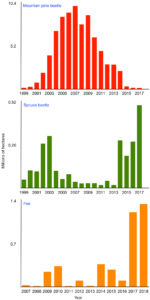
Background: British Columbia has recently been affected by insect infestations and fire. Mountain pine beetle infestations are currently declining in British Columbia due to depletion of the insect’s suitable hosts, but the beetles have now moved into novel hosts – hybrid and jack pines – in Alberta. They now threaten the remainder of Canada’s boreal forest. Spruce beetle infestations have increased substantially in recent years, particularly in the central interior of BC. The summers of 2017 and 2018 saw record-breaking fire activity in British Columbia, along with massive, catastrophic fires in other parts of western North America.
Research objectives: Bark beetle infestations and fire interact with each other, and with anthropogenic landscape modifications and climate change. This has caused major perturbations in forested ecosystems in the interior of British Columbia and in Alberta. The main objective of this research is to determine the effect of massive disturbance events on arthropod assemblages, their related ecological services, and resilience under a shifting climate regime. Other objectives include: (a) identifying indicator species that can be used by silvicultural managers to monitor future forest health and recovery; (b) creating species lists, along with vouchered specimens and data, as baseline natural history data in an under-surveyed region of Canada; and (c) detection and investigation of species of conservation concern, cryptic species, etc. Specifically, available projects include:
About UNBC: UNBC is a small, research-intensive university in the central interior of British Columbia. It is consistently recognized as one of the top small universities in Canada. The geographic location of the main campus, as well as the several regional campuses across northern and northwestern British Columbia, offer ample field research opportunities. UNBC also administers two research forests within close driving distance to the main campus, and a nearby research station on the Quesnel River.
UNBC maintains extensive, modern laboratory facilities including a molecular biology core facility and an environmental analytical lab. Researchers also have access to high-performance computing as well as comprehensive GIS infrastructure. Our insect ecology lab at UNBC, is accessible and well-supplied with field equipment, research vehicles, microscopes, and molecular biology equipment. A list of publications from our research group can be found here.
Prince George is the largest city in British Columbia’s central interior (population ~80,000) and supports the surrounding area with services ranging from education to comprehensive health care to shopping and other commercial activities. The city has active outdoor recreational, sporting, and cultural communities and there are always opportunities to get involved and meet others. For more information about things to do in and near the city, please see the Tourism Prince George website.
Study and stipend details: Undergraduate students interested in this work should be enrolled at UNBC in a relevant degree program. Most undergraduates will work as field assistants for graduate students. In some cases (honours thesis, undergraduate thesis, NSERC USRA), students will also work on their own project.
Graduate student degrees (Ph.D. and M.Sc.) will be run within the Natural Resources and Environmental Studies Institute at UNBC. More information about the NRESI and its graduate programs can be found here.
Graduate students without external funding will be provided with stipends related to current NSERC graduate-level stipends. Direct funding will be provided for an average of six months each year, and students will usually be required to work as teaching assistants or find external funding beyond that. There are generally sufficient teaching assistant opportunities available in our department to ensure full yearly stipends. In addition, UNBC and the Province of British Columbia offer a variety of graduate scholarships to eligible students, and all Ph.D. students receive an automatic 100% tuition rebate for up to four years. Students who arrive with or bring in external funding will have their external stipends topped-up via available internal research funds.
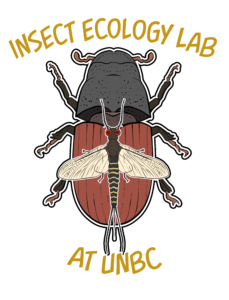 Requirements: Successful graduate candidates must have an appropriate prior degree from a recognized university for admittance. Top candidates will be able to demonstrate a keen and continuing interest in insect ecology, biodiversity, and community ecology – previous research experience in these fields will be considered advantageous. Applicants should have prior field and lab research experience, as well as strong statistical/analytical capabilities. Applicants must be independent thinkers and must also demonstrate a solid grasp of the English language.
Requirements: Successful graduate candidates must have an appropriate prior degree from a recognized university for admittance. Top candidates will be able to demonstrate a keen and continuing interest in insect ecology, biodiversity, and community ecology – previous research experience in these fields will be considered advantageous. Applicants should have prior field and lab research experience, as well as strong statistical/analytical capabilities. Applicants must be independent thinkers and must also demonstrate a solid grasp of the English language.
Ph.D. applicants will preferably have published (or recently submitted) one or more research papers in peer reviewed journals. Publishing experience will be considered an asset for M.Sc. applicants, but is not necessary.
Undergraduate applicants should have a strong interest in entomology and/or ecology, and a willingness to learn.
We encourage Indigenous people, visible minorities, diversely-abled people, women, and people from the LGBTQ2S+ communities to apply.
Initial application process: Graduate candidates should send the following application package to Dr. Dezene Huber at huber@unbc.ca:
Undergraduates should contact me via email and they do not need to submit a cover letter or CV.
The review of applications will be ongoing until candidates are found, but applying earlier is better for access to potential graduate scholarships, and to teaching assistantships.
Successful preliminary applicants will be invited to formally apply to UNBC.
Other useful links: